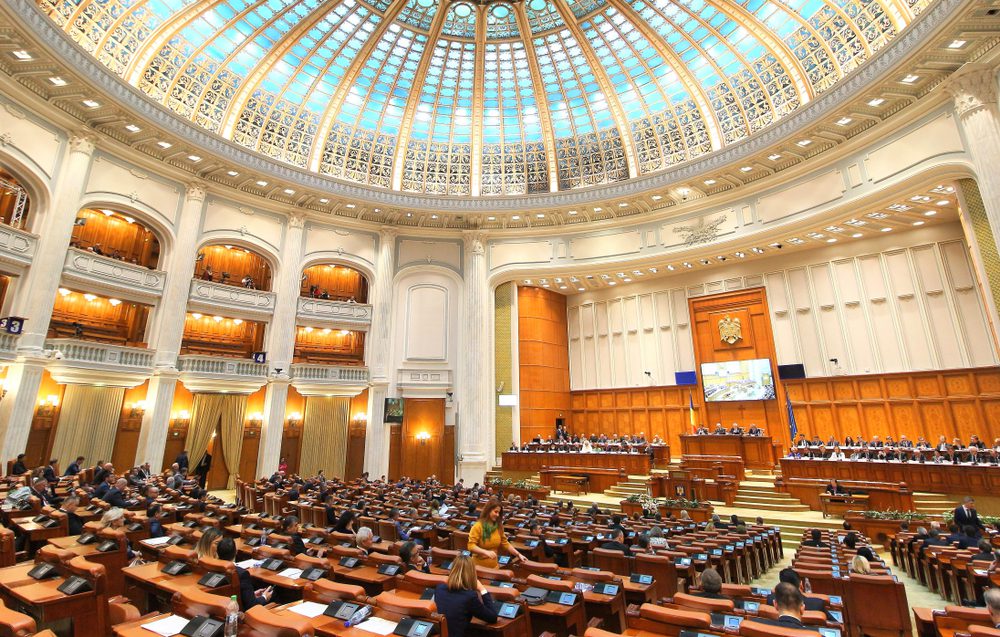
On Friday, May 12th former Romanian Prime Minister Ludovic Orban announced he would press charges against several protesters, after a demonstration in front of the parliament building by supporters of the opposition AUR party turned violent two days prior. The Ex-PM was physically assaulted, while another parliamentarian reported being threatened and booed. The incident occurred while AUR representatives inside the parliament objected to a proposed child protection law, the Adevărul reported.
“On Monday morning I will file a complaint with the police against those who assaulted me. I’m not doing it out of personal grudge. I’m doing it because violence cannot be tolerated in society,” Orban wrote on his Facebook page on Friday. “By not punishing those who have been violent, the proliferation of such anti-social behavior is encouraged.”
Ex-Prime Minister Orban—who led a center-right Romanian government in 2019-2020—was reportedly trying to enter the senate building when a group of protesters attacked him on the street.
“I wouldn’t wish what happened to me on anyone,” Orban said. “I was spat on, insulted, pushed multiple times, hit and kicked,” he said after the incident. “This is not democracy, this is not how we stand up for our views. It’s not by rallying thugs, scoundrels, and bullies to attack those who have a different opinion. It was me they attacked today, it could be any dissenting citizen tomorrow,” he added.
A day later, current Prime Minister Nicolae Ciucă also addressed the episode, calling for politicians to take more responsibility for how their supporters behave and asked them not to “mislead” the population about political decisions, especially when there’s a war going on in the neighboring country. “Romania does not need destabilization,” Ciucă added.
However, some members of the AUR have insisted that the attack on Orban was an inside job, meant to discredit the party and portray its supporters as violent thugs. “In our opinion, this was a set-up,” Ilie-Alin Coleșa, a parliamentary representative of AUR said. “Of all the other entrances available, Orban showed up at that very entrance where the protest was. There were some agitators there, who were not AUR members or sympathisers. They were the ones who instigated the shoving and perhaps the spitting on the former PM.” Coleșanoted that the previous weekend’s AUR protests were “very peaceful, without any incident.”
Another politician who was targeted by demonstrators was Botond Csoma, the parliamentary chairman of the Hungarian minority’s party, RMDSZ. He was threatened and insulted but with police intervention managed to reach the parliament building unharmed. “They booed and threatened me, but did not hurt me,” said Csoma, recalling the incident, adding that “what happened was unacceptable.”
According to police, four of Orban’s attackers have been identified and fined 3,000 lei (€600) each, while a fifth person was also fined 1,500 lei (€300) for attempting to attack Csoma. In total, the police handed out 45 fines during the protest, totaling more than 50,000 lei (€10,000).
The law which prompted the violent response from protestors was proposed by Family and Youth Minister Gabriela Firea back in February, and is meant to create a “National Children’s Observatory”—a database for children in exposed or vulnerable positions, including some 47,000 orphans, as well as victims of extreme poverty or domestic abuse. According to the current centrist government, the database is meant to help the work of regional child protection and social services, while tackling the issue of children being unable to go to school.
Opponents of the law, however, asserts the database would allow authorities to arbitrarily decide whether a parent is fully capable of caring for their children, paving the way for possible abuses of power. “It is obvious that the poor are the first to be targeted, followed by the disabled and unvaccinated children, and not just these categories. This project opens a Pandora’s box of abuse!” the AUR party’s official site reads.
According to George Simion, president of AUR, the protest was necessary because the government decided to put the proposal to vote without “the promised preliminary debate.” Therefore, “the legislation was adopted in a non-transparent, undemocratic way.” He also said reports of the violent protests were highly exaggerated, noting that only ex-PM Ludovic Orban suffered any physical harm.
Despite the objections from the deputies of AUR, the law was adopted with 222 votes for and only 40 against it.
